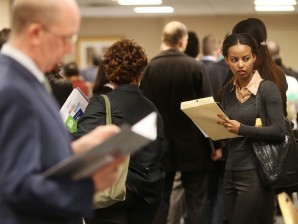WASHINGTON – Four miles from Capitol Hill, Michael Tate looked for a job — any job — as he cringed at prospects of losing unemployment benefits and appealed to US lawmakers who left him and others in the lurch.
“I’ve got rent to pay, and it will be a crisis if I don’t find a job. I don’t want to go back out to the street,” a somber Tate told AFP as he emerged from an unemployment center in Washington where every computer screen was taken by a job-seeker.
Tate, a Vietnam war veteran in his 50s, said he has been unemployed since July. And while the US economy has improved slightly, with the jobless rate now at a five-year low of 7.0 percent, millions of Americans are taking longer to find work.
Tate’s jobless benefits, which amount to about $1,400 per month, will end in January unless Congress approves an extension of the federal government’s emergency unemployment compensation.
He will then join the 1.3 million Americans who were cut off from the extended unemployment benefits just three days after Christmas.
The White House warns that by the end of 2014, another 3.6 million people will lose the benefits that kick in beyond the 26 weeks provided by most states.
Congress is debating whether to renew the program, which began under the George W. Bush administration as a way to cushion the blow for millions of Americans who lost their jobs in the recession that started in 2008.
A bipartisan bill that extends the insurance for three months will be introduced when lawmakers return to work on January 6, and President Barack Obama has prodded Congress to pass it.
But there could be pushback in a divided legislature where lawmakers prepare for mid-term elections next November.
The program is costly — the federal government has spent more than $200 billion on it in five years — and some Republicans have argued that extending it is the wrong way to go about reining in government spending.
But the Obama administration stresses the payments have kept more than 11.4 million people out of poverty, and failure to extend benefits could have a significant economic impact.
The Congressional Budget Office says inaction could shed 0.2 percentage points or more off gross domestic product; experts say that could cost 240,000 jobs.
Tate said it was shameful for Congress to leave town without extending the benefits.
“This is America, we still have to help people,” argued Tate, who spent an hour at an American Job Center on Monday searching online databases for job opportunities.
“We have worked, and paid taxes. We can’t find a job, so what are we supposed to do?”
Belt-tightening
“People are definitely in crisis mode,” said Monica West, a specialist at Washington’s Department of Employment Services where Tate and others look for leads.
“It’s taking people longer to find employment,” she said. “To send out 100 to 200 resumes and not get one call back, that’s pretty frustrating.”
But Alex Brill of the American Enterprise Institute, a conservative-leaning think-tank, downplayed effects that non-extension of benefits would have on the economy.
“More important is the fact that we have a very serious problem with the long-term unemployment in the United States and that this program is a very poor tool for helping these people get back to work,” Brill told AFP.
The benefits allow some to stay on the dole longer while looking for better-paying jobs, while accepting lower-wage work would reduce unemployment.
By contrast, the benefits are fed back into the system in the form of consumer purchases, stimulating the economy and generating jobs.
Corey Joyner is counting on the support. The 43-year-old Washingtonian has been looking for construction work for months, but keeps getting turned away.
Joyner is straining to get by with his son on a weekly benefit of $359. He does not know where he’ll turn when that aid runs out.
“I got to do what I got to do,” he said. “Food’s got to be on my table.”
